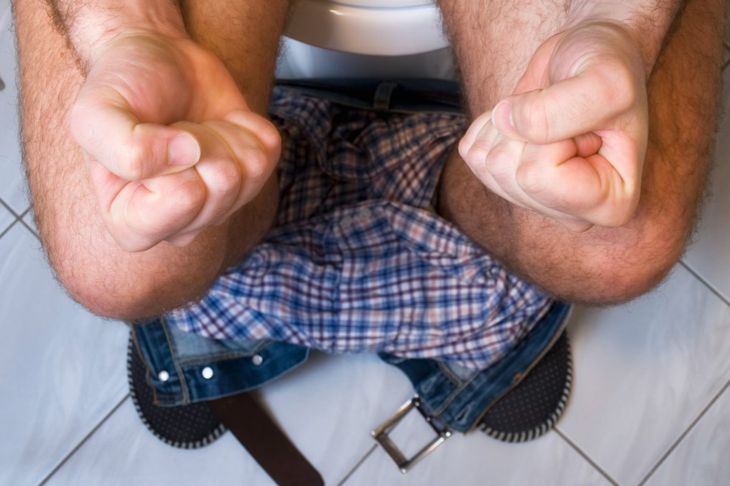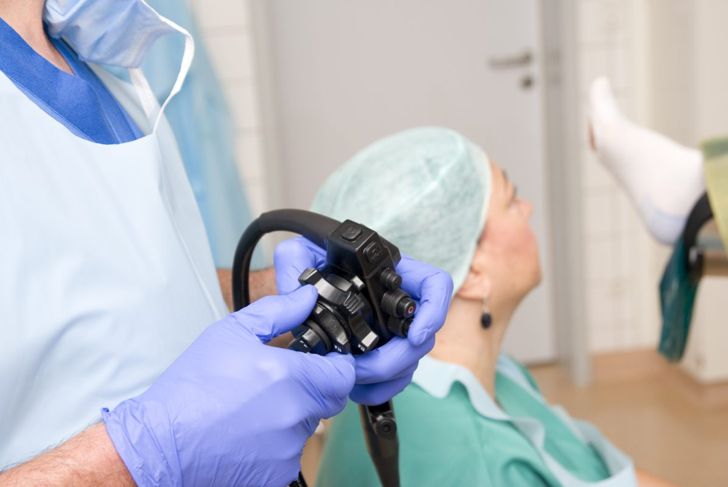Rectal bleeding is usually caused by blood from the lower portion of the GI tract, specifically the lower colon and the rectum itself, but it can refer to any blood coming from the anus. Blood coming from the rectum usually appears bright red, but it can be maroon or darker, depending on the source of the bleeding.
Color
The color of the blood in rectal bleeding depends on its source. The darker the blood, the higher in the digestive system the bleeding originates. Dark, tar-like stool, called melena, often indicates bleeding in the stomach. Maroon blood typically comes from the small bowel and bright red blood from the colon or rectum.
Appearance
Rectal bleeding may be noticed in various ways. Some people see it when wiping or in the toilet after a bowel movement. Others may notice that their stool is not a normal color, appearing dark red or black. The stool’s consistency may be similar to coffee grounds or tar. Sometimes, rectal bleeding occurs in small amounts that are not visible with the naked eye. This is called occult bleeding and can be detected via a fecal occult blood test using a small sample of stool.
Symptoms
In addition to seeing blood, people with rectal bleeding may notice other signs, including pain or pressure in the rectum, feeling lightheaded or dizzy, and fainting. Seeing blood of any kind, with or without additional symptoms, may indicate a serious problem, though sometimes the cause is minor and easily treated. For example, hemorrhoids can cause bright red blood in the stool or on toilet tissue when wiping
Prevalence
Rectal bleeding is a common symptom in adults. For most people, it is intermittent and resolves quickly, sometimes without treatment. A lot of people do not seek medical attention when they notice rectal bleeding, perhaps because they have no other troubling symptoms. Rectal bleeding can be a sign of significant health problems, though, so it is important to have it checked by a doctor.
Hemorrhoids
The most common cause of rectal bleeding is hemorrhoids. Most hemorrhoids resolve with a high-fiber diet, increased fluid intake, and topical over-the-counter-treatments. When rectal bleeding from hemorrhoids is significant or if they are particularly painful and do not respond to other treatments, the person may require further interventions, including rubber band ligation, sclerotherapy, or laser coagulation.
Anal Fissure
Anal fissures are another cause of rectal bleeding, and can be mistaken for hemorrhoids. Anal fissures occur when the skin around the anus tears or cracks, most commonly because of very hard stools and extreme pressure during a bowel movement. In addition to rectal bleeding, anal fissures also cause burning during bowel movements. They usually heal on their own.
Diverticulosis and Diverticulitis
Diverticulosis and diverticulitis can also rectal bleeding. Diverticula are small pouches that, when they protrude through the walls of weakened areas of the intestine, are diagnosed as diverticulosis and may lead to bloody stools and a change in bowel habits. Occasionally, these pouches become infected. This is diverticulitis, a condition that causes fever and abdominal pain.
Inflammatory Bowel Disease
A more serious cause of rectal bleeding is inflammatory bowel disease or IBD. There are two types of IBD. Crohn’s disease causes inflammation anywhere in the GI tract, while colitis causes inflammation in the large intestine or colon. Symptoms of IBD include diarrhea, abdominal pain, cramping, blockages, and rectal bleeding.
When to Call the Doctor
Sometimes, rectal bleeding is minor and goes away on its own, but it can be a sign of significant health problems, including colorectal cancer. People experiencing fresh blood in their stools, pain in the rectum when passing stools, lack of bowel control, unexplained weight loss, a drop in blood pressure, dizziness, or fainting should see a doctor.
Diagnosis
To find the cause of rectal bleeding, a doctor will first get a history concerning the patient’s bowel habits and when the bleeding started. Once they narrow down a cause, additional testing can verify the source of the bleeding and determine treatment. These tests may include a physical exam of the rectum, a colonoscopy, or a fecal occult blood test.

 Home
Home Health
Health Diet & Nutrition
Diet & Nutrition Living Well
Living Well More
More




















